六年级英语下册随堂笔记
英语六年级下册十模块课堂笔记

英语六年级下册十模块课堂笔记模块一:Unit 1-3英语六年级下册十模块第一单元主要内容是与“我的朋友”有关的学习。
在这个单元,我们学习了如何用英语来介绍我们的朋友、描述他们的外貌、爱好和性格特点。
同时,我们还学习了如何询问别人的基本信息以及如何礼貌地回答别人的问题。
1. 学习目标:- 能够介绍自己的朋友,并描述他们的外貌、爱好和性格特点;- 能够询问和回答基本问题,如姓名、年龄、家庭等;- 掌握一些日常用语和礼貌用语。
2. 教学重点:- 学生能够正确地运用基本的英语表达式;- 学生能够用英语询问和回答基本问题;- 学生能够对自己和他人的外貌、爱好和性格特点做简单的描述。
3. 教学难点:- 学生能够用英语对他人的外貌、爱好和性格特点进行准确的描述。
模块二:Unit 4-6英语六年级下册第二单元的主要内容是“我的家庭”,我们将学习如何介绍我们的家人、描述他们的外貌、爱好和性格特点。
同时,我们还将学习一些有关家族历史和文化的知识。
1. 学习目标:- 能够介绍自己的家人,并描述他们的外貌、爱好和性格特点;- 能够了解自己和他人的家族历史和文化;- 能够正确运用一些日常用语和礼貌用语。
2. 教学重点:- 学生能够正确地运用英语表达式;- 学生能够用英语描述和介绍自己的家庭;- 学生能够了解家族历史和文化。
3. 教学难点:- 学生能够用英语对自己和他人的家族历史和文化进行准确的描述。
模块三:Unit 7-9英语六年级下册第三单元的主要内容是“我的学校”,我们将学习如何介绍自己的学校,包括学校的位置、建筑、课程、教师、学生等。
同时,我们还将学习如何用英语进行简单的日常交流。
1. 学习目标:- 能够介绍自己的学校,并描述学校的位置、建筑、课程、教师、学生等;- 能够运用常用的日常交流语言;- 能够了解学校文化和校规校纪。
2. 教学重点:- 学生能够正确地运用英语表达式;- 学生能够描述和介绍自己的学校;- 学生能够正确用英语进行日常交流。
六年级英语下册课堂笔记
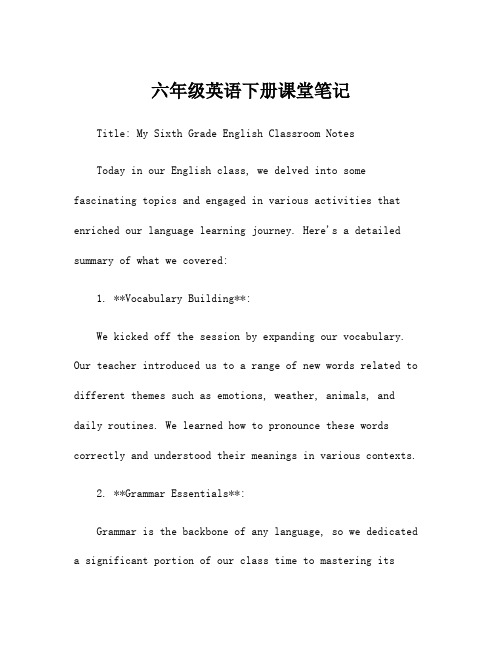
六年级英语下册课堂笔记Title: My Sixth Grade English Classroom NotesToday in our English class, we delved into some fascinating topics and engaged in various activities that enriched our language learning journey. Here's a detailed summary of what we covered:1. **Vocabulary Building**:We kicked off the session by expanding our vocabulary. Our teacher introduced us to a range of new words related to different themes such as emotions, weather, animals, and daily routines. We learned how to pronounce these words correctly and understood their meanings in various contexts.2. **Grammar Essentials**:Grammar is the backbone of any language, so we dedicated a significant portion of our class time to mastering itsessentials. We revised topics like verb tenses, sentence structure, and parts of speech. Through interactive exercises and examples, we honed our grammar skills and gained confidence in constructing grammatically correct sentences.3. **Reading Comprehension**:Reading comprehension plays a crucial role in language acquisition. Today, we engaged in reading passages that were both informative and entertaining. We practiced extracting key information, identifying main ideas, and making inferences from the text. This activity not only enhanced our reading skills but also broadened our knowledge on various topics.4. **Writing Practice**:Writing is an indispensable skill in English. We spent time honing our writing abilities by composing short paragraphs and essays. Topics ranged from personal experiences to imaginative stories. We focused on organizingour thoughts coherently, using appropriate vocabulary, and paying attention to grammar and punctuation. Peer feedback sessions allowed us to learn from each other and improve our writing skills collaboratively.5. **Listening and Speaking Activities**:Effective communication involves both listening and speaking. Through audio clips, dialogues, and group discussions, we sharpened our listening comprehension andoral communication skills. We practiced listening forspecific information, responding to questions, and expressing our opinions on various topics. These activities fostered active participation and helped us become more fluent speakers.6. **Cultural Insights**:Learning a language goes beyond vocabulary and grammar;it also involves understanding the culture associated with it. In today's class, we explored cultural aspects such astraditions, customs, and celebrations in English-speaking countries. This not only enriched our cultural knowledge but also provided valuable insights into how language is intertwined with society.7. **Interactive Learning Tools**:Our teacher utilized various interactive learning tools and resources to make the class engaging and dynamic. From multimedia presentations to online quizzes, these tools enhanced our learning experience and catered to different learning styles.In conclusion, today's English class was both enriching and enjoyable. We covered a wide range of topics, from vocabulary building to cultural insights, and actively participated in diverse activities that deepened our understanding of the English language. By consistently practicing and exploring different facets of the language,we're steadily progressing towards becoming proficient English speakers and communicators.。
六下英语课堂笔记

六下英语课堂笔记
在六年级英语课堂上,我们学习了许多关于英语语法、词汇和句型的知识。
为了帮助自己更好地记忆所学内容,我创建了一份英语课堂笔记,并将其分享给大家。
首先,我们学习了英语中的基本时态,包括现在时、过去时和将来时。
我们还了解了各种动词的不规则变化形式,并通过练习巩固了这些知识点。
其次,我们学习了如何使用形容词和副词来描述人、物或事情。
我们了解到形容词可以用来描述名词的性质和特征,而副词则可以用来描述动作的方式、时间等。
除此之外,我们还学习了如何使用介词、连词和冠词等词类,以及如何正确运用它们来构建完整的英语句子。
最后,在课堂的最后几周,我们开始学习一些常见的英语短语和惯用语,例如“take care”、“look forward to”等等。
这些短语和惯用语对于学习和掌握英语口语非常重要。
总而言之,通过课堂笔记的记录和整理,我对英语语法、词汇和句型等方面有了更深层次的理解。
我相信这份笔记也可以帮助其他同学更好地掌握英语知识,提高他们的英语水平。
六年级下册英语的单元a部分课堂笔记
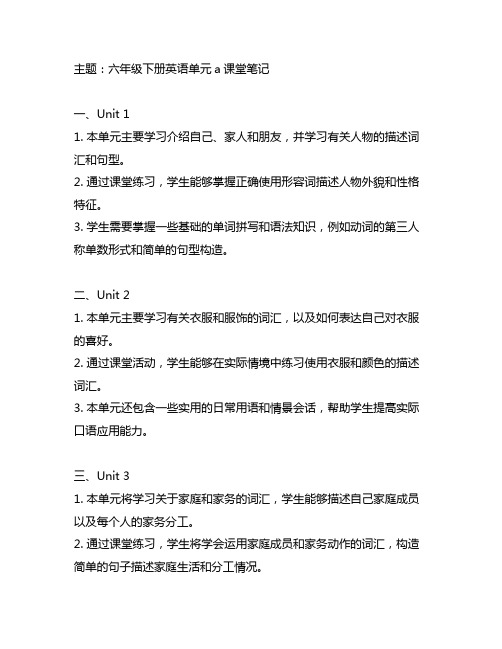
主题:六年级下册英语单元a课堂笔记一、Unit 11. 本单元主要学习介绍自己、家人和朋友,并学习有关人物的描述词汇和句型。
2. 通过课堂练习,学生能够掌握正确使用形容词描述人物外貌和性格特征。
3. 学生需要掌握一些基础的单词拼写和语法知识,例如动词的第三人称单数形式和简单的句型构造。
二、Unit 21. 本单元主要学习有关衣服和服饰的词汇,以及如何表达自己对衣服的喜好。
2. 通过课堂活动,学生能够在实际情境中练习使用衣服和颜色的描述词汇。
3. 本单元还包含一些实用的日常用语和情景会话,帮助学生提高实际口语应用能力。
三、Unit 31. 本单元将学习关于家庭和家务的词汇,学生能够描述自己家庭成员以及每个人的家务分工。
2. 通过课堂练习,学生将学会运用家庭成员和家务动作的词汇,构造简单的句子描述家庭生活和分工情况。
3. 本单元还将通过课堂游戏和角色扮演,帮助学生提高口语交流能力和团队合作能力。
四、Unit 41. 本单元将学习有关食物和饮料的词汇,学生能够描述自己喜欢的食物和饮料,并表达食物的口感和味道。
2. 通过课堂活动,学生将学会在实际情境中讨论食物偏好,并学习一些常用的餐厅用语和点餐对话。
3. 本单元还包含一些与食物相关的文化知识和风俗习惯,帮助学生了解不同国家和地区的饮食习惯和饮食文化。
五、Unit 51. 本单元将学习有关动物和自然界的词汇,学生能够描述自己喜欢的动物和环保意识。
2. 通过课堂练习,学生将学会用英语描述动物的外貌特征和生活习性,并能够参与有关动物保护和环保的讨论。
3. 本单元还将通过学习一些与自然和环境保护相关的诗歌和歌曲,帮助学生了解自然界的美好并培养环保意识。
通过以上的课堂笔记,我们可以清晰地了解到六年级下册英语单元a的课程安排和学习目标。
这些内容涵盖了学生在日常生活中所需要用到的基础英语词汇和语法知识,同时也注重培养学生的口语交流能力和团队合作意识。
希望学生们能够在老师的指导下,认真学习每个单元的内容,积极参与课堂活动,提高英语水平,为将来的学习和工作打下坚实的基础。
人教六年级下册英语课堂笔记
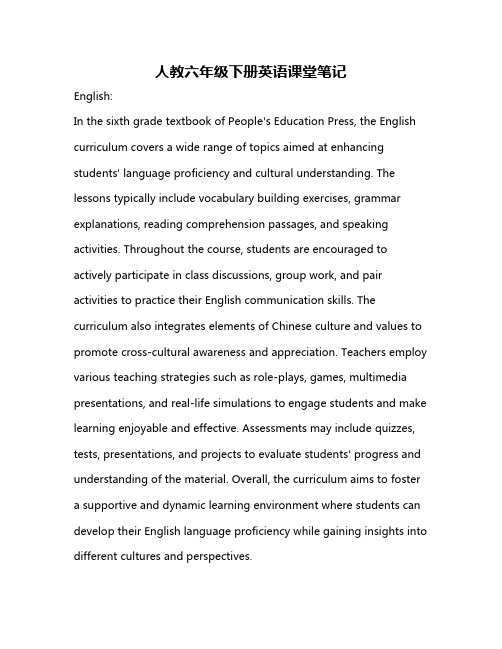
人教六年级下册英语课堂笔记English:In the sixth grade textbook of People's Education Press, the English curriculum covers a wide range of topics aimed at enhancing students' language proficiency and cultural understanding. The lessons typically include vocabulary building exercises, grammar explanations, reading comprehension passages, and speaking activities. Throughout the course, students are encouraged to actively participate in class discussions, group work, and pair activities to practice their English communication skills. The curriculum also integrates elements of Chinese culture and values to promote cross-cultural awareness and appreciation. Teachers employ various teaching strategies such as role-plays, games, multimedia presentations, and real-life simulations to engage students and make learning enjoyable and effective. Assessments may include quizzes, tests, presentations, and projects to evaluate students' progress and understanding of the material. Overall, the curriculum aims to foster a supportive and dynamic learning environment where students can develop their English language proficiency while gaining insights into different cultures and perspectives.中文翻译:在人民教育出版社的六年级英语教科书中,英语课程涵盖了广泛的主题,旨在提高学生的语言水平和文化理解能力。
六年级下册英语书课堂笔记
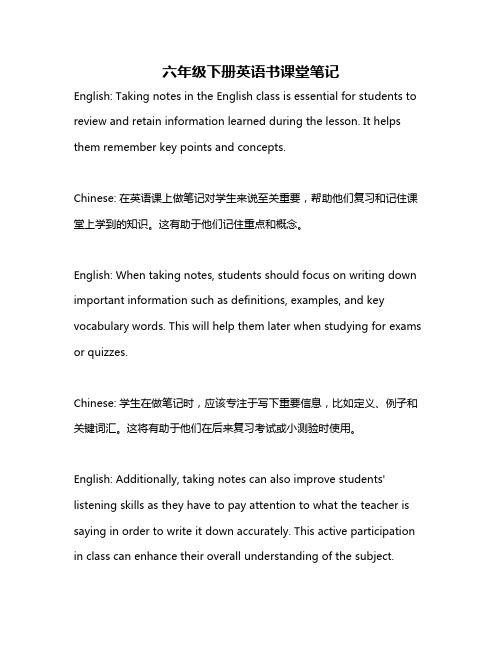
六年级下册英语书课堂笔记English: Taking notes in the English class is essential for students to review and retain information learned during the lesson. It helps them remember key points and concepts.Chinese: 在英语课上做笔记对学生来说至关重要,帮助他们复习和记住课堂上学到的知识。
这有助于他们记住重点和概念。
English: When taking notes, students should focus on writing down important information such as definitions, examples, and key vocabulary words. This will help them later when studying for exams or quizzes.Chinese: 学生在做笔记时,应该专注于写下重要信息,比如定义、例子和关键词汇。
这将有助于他们在后来复习考试或小测验时使用。
English: Additionally, taking notes can also improve students' listening skills as they have to pay attention to what the teacher is saying in order to write it down accurately. This active participation in class can enhance their overall understanding of the subject.Chinese: 此外,做笔记还可以提高学生的听力技能,因为他们必须专注于老师说的内容,才能准确地记录下来。
六年级下册人教版英语书课堂笔记

六年级下册人教版英语书课堂笔记全文共3篇示例,供读者参考篇1Here are some classroom notes on the 6th grade English textbook (second semester, PEP edition) from a student's perspective, approximately 2000 words long, written in English:English Class Notes - 6th Grade, Second SemesterUnit 1: My HobbiesLearned vocabulary related to hobbies like reading, swimming, playing basketball etc.Practiced making sentences about our hobbies using "I like..." and "I enjoy..."Learned to ask and answer "What's your favorite hobby?"Read a text about a student's hobby of collecting stamps. Learned new words like "collection", "valuable", "album" etc.Did a fun activity where we talked about our own hobbies and why we enjoy them.Unit 2: A Letter to GrandpaLearned vocabulary related to family members - grandpa, grandma, uncle, aunt etc.Practiced using possessive adjectives like my, your, his, her etc.Read a model letter that a girl wrote to her grandpa. Learned the format and language for informal letters.As a writing exercise, we wrote our own letters to a family member, describing our daily life and asking them questions.Unit 3: Keeping FitThis unit was all about sports, exercise and healthy habits.Learned words and phrases related to different sports like basketball, badminton, swimming etc.Read a text about the importance of exercise and a balanced diet for kids our age.Practiced using frequency adverbs like always, often, sometimes, rarely etc.Had an interesting class discussion about our favorite sports/activities to keep fit.Unit 4: The SeasonsLearned vocabulary for the four seasons - spring, summer, fall (autumn), winter.Described the typical weather and activities for each season using "In spring/winter..." sentences.Read a beautiful poem about the changing seasons and nature.As a project, we made season calendars showing seasonal flowers, fruits, festivals etc.Unit 5: Jack and the BeanstalkThis was a fun unit where we read the classic fairy tale "Jack and the Beanstalk".Learned lots of new words from the story like beanstalk, giant, golden eggs, magic beans etc.Practiced retelling the story in our own words, focusing on using connectors like first, then, after that etc.Did some roleplaying activities where we acted out parts of the story.Watched a short animated video of the story which was really engaging!Unit 6: A Hundred Years from NowIn this unit, we learned about the future and made predictions.Studied the "will" and "going to" future tenses through examples and practice exercises.Read a funny text imagining what life might be like 100 years from now - things like robot teachers!Wrote a paragraph describing our own predictions for the future based on the development of technology.Had an interesting debate - would we actually want to live in such a futuristic world?Unit 7: Protecting Our EnvironmentThis unit covered the important topic of environmental protection.Learned vocabulary related to nature, pollution, conservation etc.Read and discussed two texts - one about the causes of environmental damage and another about ways kids can help protect the environment.Watched an educational video on things like recycling, saving energy and water conservation.As a class, we came up with ideas to make our school more eco-friendly and presented them.Unit 8: Travel StoriesThe last unit was all about traveling to different places.Studied questions with "how" to ask about modes of transportation, journey duration etc.Learned vocabulary for different types of holiday activities like sightseeing, hiking, camping etc.Read two short travel stories - one about a beach vacation and another about a trip to the mountains.Worked on a fun project where we created& brochures promoting a tourist destination of our choice.Overall, this semester was packed with diverse and engaging topics, activities and projects that really helped improve our English skills across reading, writing, speaking and listening. I've gained a lot more confidence in understanding and using English now. Looking forward to continuing my learning journey next year!篇2Here are classroom notes for a 6th grade English textbook (PEP Edition) in about 2000 words, written from a student's perspective:Class Notes: 6th Grade English (PEP Edition)Unit 1: My HobbyLearned vocab words related to hobbies like collect, paint, read, etc.Practiced making sentences about our hobbies using "I like..." structureListened to a dialogue between two friends discussing their hobbiesWrote a short paragraph describing my favorite hobbyUnit 2: At the BookstoreLearned names of different sections at a bookstore (fiction, travel, etc.)Practiced asking & answering questions like "Where is the __ section?"Read a short text about a boy's trip to the bookstore with his momDid a role-play activity where we pretended to be shoppers/staff at a bookstoreUnit 3: Treasures from the PastLearned vocab for ancient civilizations, archaeology, artifactsWatched a video about young archaeologists digging at an excavation siteWrote a short essay imagining we discovered an ancient artifactGave a presentation on an ancient civilization we researchedUnit 4: Our Community HelpersTalked about different community helpers' jobs (police, firefighters, etc.)Listened to interviews with a doctor and a teacher about their workDid a group project making posters highlighting different helpersWrote a thank you letter to a community helper who helped usUnit 5: How Does Your Garden Grow?Learned vocabulary related to plants, gardening tools, growing thingsRead an article with tips & advice for starting your own gardenWatched a video showing the life cycle of a plantstep-by-stepDid an experiment planting some seeds and tracking their growthUnit 6: Animals Up CloseStudied animal characteristics, habitats, endangered speciesListened to different animal sounds and guessed what they wereGave an oral presentation on our favorite animal using visual aidsRead first-hand accounts from wildlifephotographers/scientistsUnit 7: Going GreenDiscussed environment, pollution, recycling and conservationWatched a documentary clip on the Great Pacific Garbage PatchDid a waste audit at our school and made recycling suggestionsHad a debate about the pros and cons of plastic bag bansUnit 8: Let's TravelLearned vocabulary for transportation, lodging, tourist activitiesListened to people describing different travel experiencesWrote a travel journal entry about an imaginary family vacationGave directions to a tourist attraction using maps & visual cuesUnit 9: Fitness FunStudied words related to sports, exercise, healthy habitsInterviewed classmates about their favorite fitness activitiesTracked our daily activity with a pedometer for a weekCreated an exercise routine and demonstrated it for the classThat covers the key topics, activities and assignments we did over the course of 6th grade English class. It combined listening, speaking, reading and writing practice on diverse themes. Some units really sparked my interest in topics like archaeology or environmentalism. The variety of projects let us get creative too. Overall, it was an engaging way to keep improving my English skills!篇3Here are some classroom notes on the 6th grade English textbook (Vol. 2) from a student's perspective, around 2000 words in English:Unit 1: My Favorite SubjectLearned vocabulary related to school subjects like math, PE, art, etc.Practiced making simple sentences about our favorite subjects using "I like..." structureRead a dialogue between two students discussing their favorite classesLearned how to ask/answer questions about favorite subjectsUnit 2: A Letter to Zhi ZhiLearned vocabulary for describing one's day and common activitiesPracticed using prepositions of time (at, in, on)Studied the format for informal letters to a friendWrote a short letter describing our daily routineUnit 3: Keeping FitLearned vocabulary related to sports, exercise, and healthy habitsWatched a video about a student's workout routinePracticed forming negative statements with "don't/doesn't"Had a discussion about ways to keep fit and healthy lifestylesUnit 4: A Week's ActivitiesReviewed the days of the week and telling timeLearned vocabulary for common weekly events and activitiesRead a text about a student's weekly scheduleWrote about our own weekly plans using sequence wordsUnit 5: Protecting AnimalsLearned vocabulary about animals, habitats, and environmental issuesRead an article about endangered speciesWatched a video about efforts to protect pandasHad a debate about the importance of animal conservationUnit 6: Making SuggestionsStudied the grammar structure for making suggestions ("let's...", "why don't we...?")Listened to a conversation about weekend activity ideasPracticed making suggestions through role-playsWrote a paragraph with 3-4 suggestions for a class outingUnit 7: A TV ProgramLearned vocabulary related to TV shows, movies, and genresDiscussed our favorite TV programs and moviesRead a review of a children's TV seriesWrote a short review of a recent movie we watchedUnit 8: Plans for the Summer VacationReviewed vocabulary for common vacation activitiesListened to people describing their summer vacation plans Practiced using "going to" for future plansWrote about our own plans for the upcoming summer breakThroughout the semester, we also did regular grammar exercises, vocabulary reviews, listened to audio dialogues, and had conversational practice with partners. Our teacher made the lessons fun with games, role-plays, and group activities. Overall, it was an engaging way to improve our English skills!。
六年级下册英语书笔记人教版
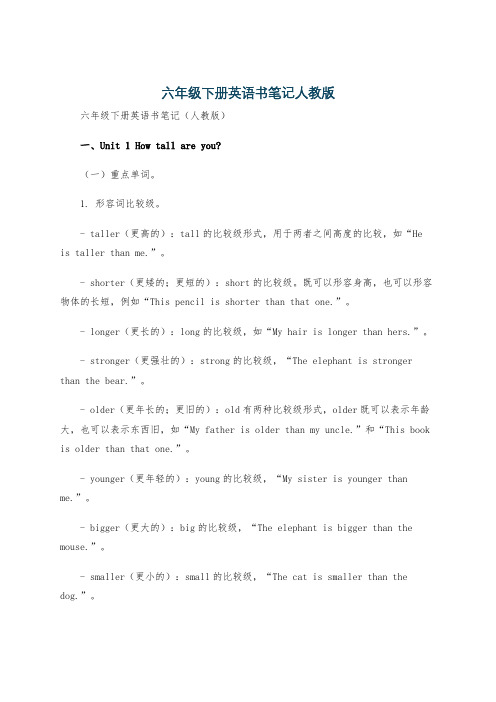
六年级下册英语书笔记人教版六年级下册英语书笔记(人教版)一、Unit 1 How tall are you?(一)重点单词。
1. 形容词比较级。
- taller(更高的):tall的比较级形式,用于两者之间高度的比较,如“He is taller than me.”。
- shorter(更矮的;更短的):short的比较级。
既可以形容身高,也可以形容物体的长短,例如“This pencil is shorter than that one.”。
- longer(更长的):long的比较级,如“My hair is longer than hers.”。
- stronger(更强壮的):strong的比较级,“The elephant is stronger than the bear.”。
- older(更年长的;更旧的):old有两种比较级形式,older既可以表示年龄大,也可以表示东西旧,如“My father is older than my uncle.”和“This book is older than that one.”。
- younger(更年轻的):young的比较级,“My sister is younger than me.”。
- bigger(更大的):big的比较级,“The elephant is bigger than the mouse.”。
- smaller(更小的):small的比较级,“The cat is smaller than the dog.”。
- thinner(更瘦的):thin的比较级,“She is thinner than her sister.”。
2. 其他重点单词。
- centimeter(厘米):长度单位,缩写为“cm”,例如“I am 150 centimeters tall.”。
- meter(米):长度单位,缩写为“m”,“The building is 50 meters high.”。
- 1、下载文档前请自行甄别文档内容的完整性,平台不提供额外的编辑、内容补充、找答案等附加服务。
- 2、"仅部分预览"的文档,不可在线预览部分如存在完整性等问题,可反馈申请退款(可完整预览的文档不适用该条件!)。
- 3、如文档侵犯您的权益,请联系客服反馈,我们会尽快为您处理(人工客服工作时间:9:00-18:30)。
The children are laughing and playing games . 2、“laugh at”表示“嘲笑”。例如: Don’t laugh at the little boy .
(十三)“be going to”表示一般将来时 “be going to +动词原形”结构表示“打算或将要做某事”,是“一般将 来时”的一种表达方式。例如: I am going to fly kites next Sunday .
each up to 20 cm long
Up to ten people can sleep in this room .
二、常用短语
from shorter to taller
from……to……
I wear size 17 .
up to……
dive into……
jump out of……
good swimmer
(三)描述身高的句型: 主语 +be动词 + 数字+ 长度单位(如:cm、m)+ tall . 例如: I’m 160 cm tall . My mother is 1.62 m tall .
(四)询问对方身高、体重、年龄、大小、长度的句型: 问句:How+形容词(如:tall/heavy/old/big/long)+be动词+主语? 答句:主语 +be动词 + 数字+ 单位(如:cm/kg/years)+ 形容词 . 例如: How tall are you ? I’m 160 cm tall . (五)形容词比较级的变化规则
构成方法
原级
比较级
规则 一般在词尾加er 变化
tall high short strong young
taller higher shorter stronger younger
不规 则变 化
以字母e结尾的词,加r。
末尾只有一个辅音字母的重读闭音 节词,应先双写这个辅音字母,再 加er。 以y结尾,并且y前面是辅音字母的 词,先把y变为i,再加er。
(十六)时间状语从句简介 引导词
when(当……时)
before(在……之前) 时间 状语 after(在……之后) 从句
till/until(直到)
as soon as(一…就…)
例句
How do you know when you have the flu ?
The game was over before you came .
(十一)“another”和“other”的区别 1、“another”表示“又一个”、“另一个”,例如: Another goal ! Have another cup of tea . 2、“other”前常加定冠词“the”,表示两个人或物中的第二个,意思 为“另一个”;表示一组中其它的人或物,意思为“其它的”。例如: I have two friends . One is Mike , the other is Peter . Tom is here , but the other boys are at school .
(七)现在进行时表示将来 I am going on a big trip .(我将要进行一次长途旅行) 用现在进行时表示将来要发生的事情或动作,常用的动词有: go,come,take等表示位置移动的动词。例如: He is coming to see you this afternoon . Miss White is taking her students to the zoo tomorrow .
(十八)“people”的可数与不可数 1、“people”表示“人,人们”时,是集合名词,本身就是复数概念, 无复数形式。例如: Some people feel sick in the winter . 2、“people”表示“民族”时,有复数形式。例如: There are 56 peoples in China .
leg foot tooth meter ton each squid lobster shark seal deep swimmer
little cm(centimeter) than kg(kilogram) even
第二模块 What’s The Matter ?
一、常用句型 (一)关心他人的“What’s the matter ?” “What’s the matter ?”表示“怎么了?” 例如: What’s the matter , John ? I have a toothache .
(十九)“a few”与“few”的区别 “a few”与“few”后面都跟可数名词复数,但意思不同。 1、“a few”表示肯定,意思是“几个”。例如:
(二十)“hurt”的用法 “hurt”作动词用时表示“伤害,弄伤,弄疼,疼痛”,既可以做及物 动词,也可以做不及物动词。例如: I hurt my leg . My leg hurts .
(四)询问第三方的感觉时,可以用以下句型: How does he/she/it/John feel ? He/She/It is + 表示感觉的形容词(happy/sad/tired/sick)。 例如: How does Amy feel ? She’s tired .
(五)如何描述对方看起来的状态---“You look +形容词” “You look +表示状态的形容词(happy/sad/tired)”句型,表示“你 看起来…”。“look”在这里是“看起来”的意思,例如: You look so happy .
He is sure to come unless he is ill .
You will go to college as long as you study hard .
注意:条件状语从句如果放在主句前,一般要用逗号分开;条件状 语从句如果放在主句后,一般不用逗号。例如:
If you have a fever , you might have the flu . You might have the flu if you have a fever .
fine late
fat big thin
easy funny heavy
good bad/ill many/much little
finer later
fattห้องสมุดไป่ตู้r bigger thinner
easier funnier heavier
better worse more less
(六)如何用“how”问体貌 How tall are you ? How old are you ? How heavy is your brother ? How long is its tail ? How big are your hands ?
(二)A比B高或重或大或小多少的句型 A + be动词+数字+单位(如:cm,kg)+形容词比较级+ than+ B 例如: You are 4 cm taller than me . I am 10 kg heavier than Tom . John is 2 years younger than her .
We went to the park after the rain stopped .
The little girl stopped crying till her mother came .
I will write to you as soon as I get to Jinan .
注意:时间状语从句如果放在主句前,一般要用逗号分开;时间状 语从句如果放在主句后,一般不用逗号。例如:
“pass”还表示“传递”,“把某物传给某人”可以用“pass sth. to sb.”例 如:
John passed the ball to Tom .
(十)表示两者之间的“between” “between”的意思是“在……之间”,当表示两者之间时,常 与“and”搭配,构成“between……and……”结构。例如: There is a football match between Class 1 and Class 2. Tom is sitting between John and Amy .
如果询问具体某个人怎么了时,要用句型“What’s the matter with + 某人?”,例如:
What’s the matter with them/him/her/you ? 类似的句型还有“What’s wrong ?” What’s wrong , Tom ? I can’t find my schoolbag .
(十四)“have”的用法 1、表示“得……病”,例如: have a cold have a fever 2、表示“吃,喝”,例如: They often have bread and milk for breakfast . 3、表示“有”,例如: I have a new pen .
(十五)让人疼痛的“ache” “ache”是个名词,表示“疼痛”,常放在表示身体部位的名词之后, 表示“……疼”,例如: headache toothache earache stomachache backache
(二)关心他人的“How are you ?” “How are you ?”表示“你好吗?” 例如: How are you , John ? Fine , thank you .
(三)询问对方的感觉时,可以用以下句型: How do you feel ? I feel + 表示感觉的形容词(happy/sad/tired/sick)。 例如: How do you feel ? I feel sick .
